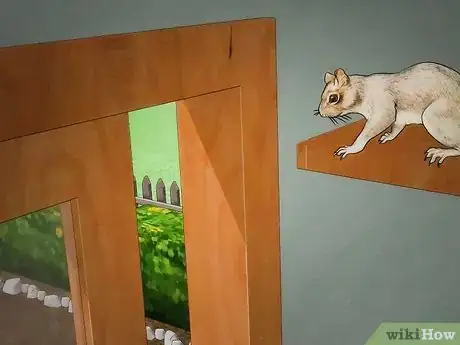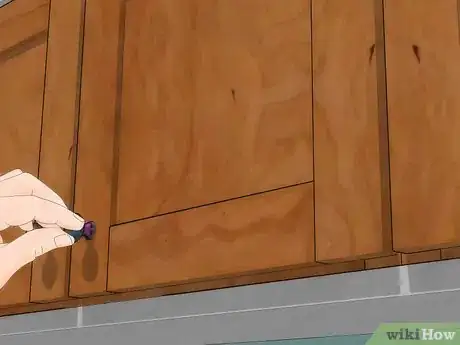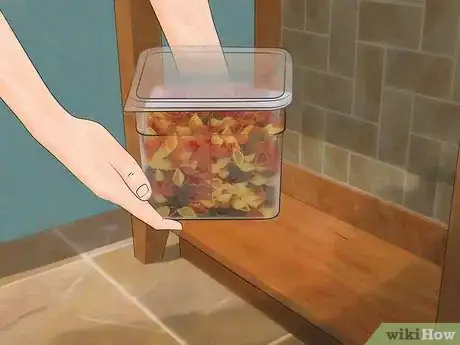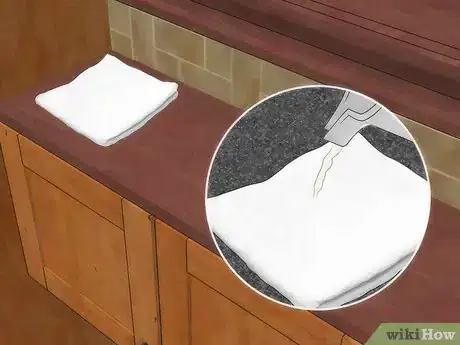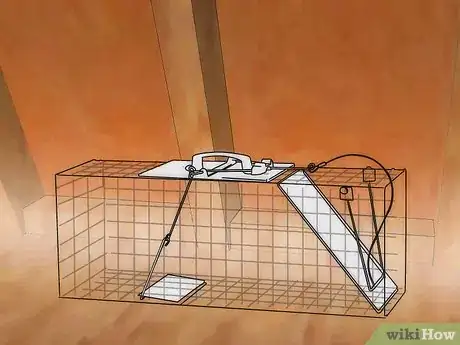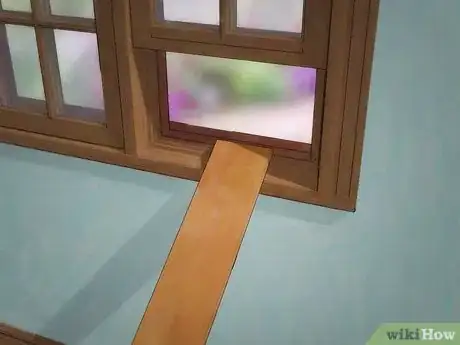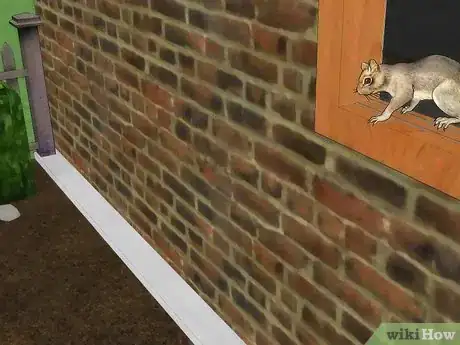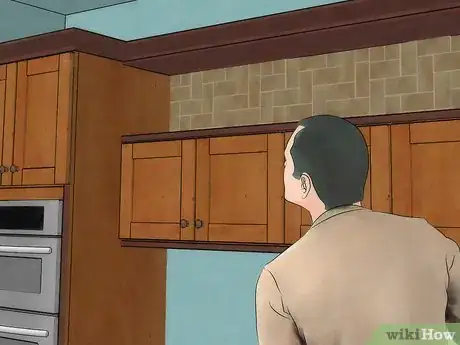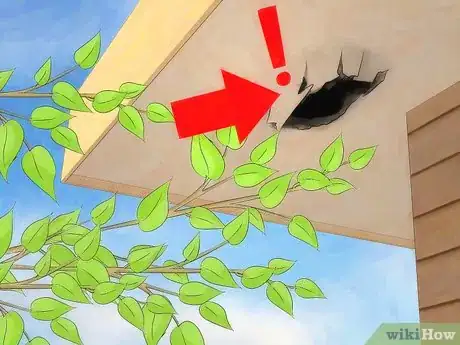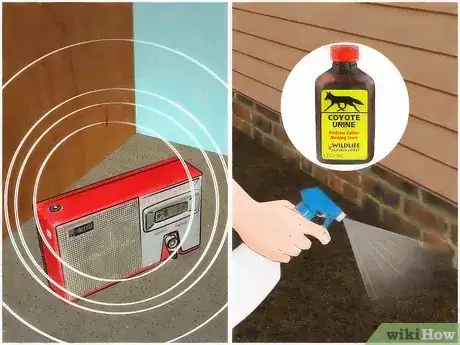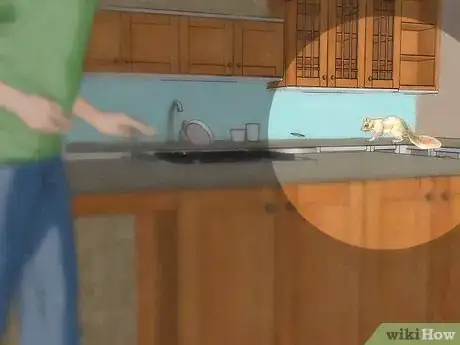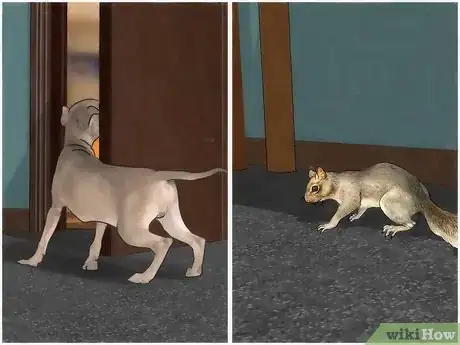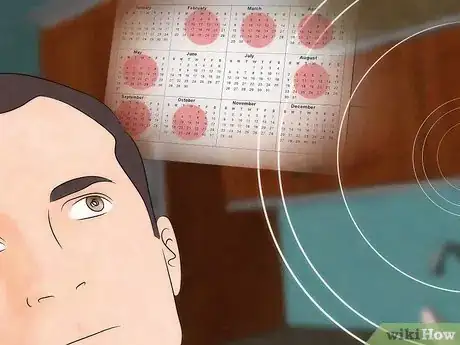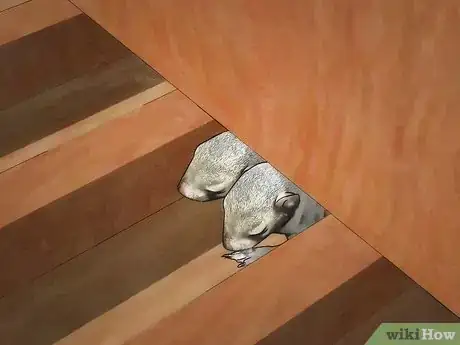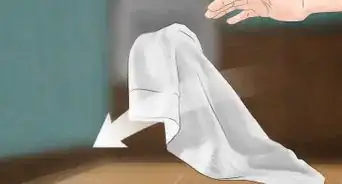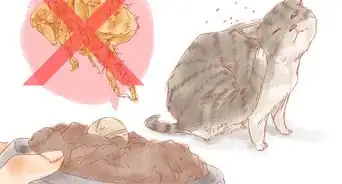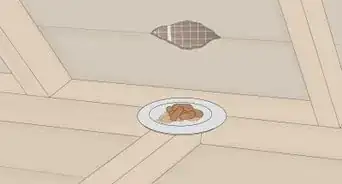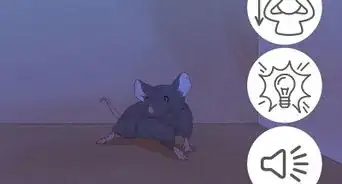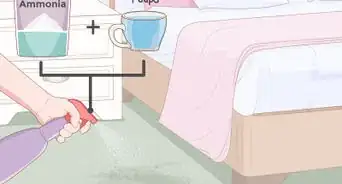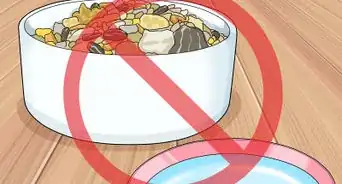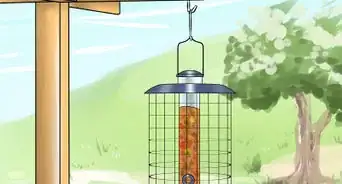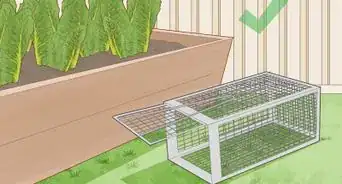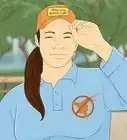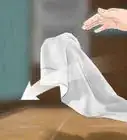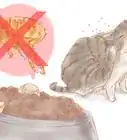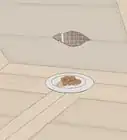This article was co-authored by Chikezie Onyianta. Chikezie Onyianta is a Pest Control Specialist and the Owner of EcoFusion Pest Control, serving communities in New Jersey, Pennsylvania, and New York. With over 5 years of experience, he specializes in pest control in both residential and commercial spaces. A graduate of Essex County College, Chikezie and EcoFusion assist in rodent, roach, and ant pest control as well as bed bug services.
There are 13 references cited in this article, which can be found at the bottom of the page.
This article has been viewed 407,089 times.
Squirrels are a cute woodland creature, but a squirrel infestation in your home can be a big problem. Squirrels can carry ticks and fleas which can easily be transmitted to you or your household pets. Squirrels also, like many rodents, tend to spray their feces and urine where they inhabit, creating a salmonella risk.[1] When a squirrel has infested your home, purging the pest without causing harm can be done easily.
Steps
Encouraging the Squirrel to Leave
-
1Provide an avenue of escape. Close off all other routes and leave a single exit to your house open, like a wide open window.[2] If getting to a window in the same room the squirrel is in puts you too close to the squirrel for your own comfort, you might:
- Open the window in the room next to the one the squirrel is in, leave the door open to that room, and close off all other routes.[3]
-
2Close off hiding spots while keeping your distance. Drawers, cupboards, and other nooks and crannies comfort the squirrel, as these may remind it of its natural habitat or its nest in the knothole of a tree. By closing these off you can prevent the intruding squirrel from hiding out in a safe place as opposed to hightailing it out of your home.[4]Advertisement
-
3Remove all food sources. Especially in inhospitable weather, like in winter or during a drought, a squirrel may be especially hard to remove if it has a food source available. Squirrels, like other rodents, have sharp teeth that can gnaw through even thick bags. Remove even closed food sources.[5]
-
4Create some incentive to leave. Squirrels, much like many animals, are sensitive to certain scents and other kinds of stimulus. In particular, squirrels have a dislike for the smell of cider vinegar, so you might want to soak some rags in the stuff and put them in the room in which your squirrel resides.
- You might also leave a radio playing constantly in the room the squirrel is in to drive it out.
- A bright light left on throughout the day and night can also make your house less appealing to squirrels.
- Predator urine can be bought from farm supply stores, sporting good centers, and online retailers. Soaking rags in predator urine, like that of a fox, could lead to your squirrel invader beating a hasty retreat.[6] [7] [8]
-
5Create loud noises for squirrels in difficult spaces. Squirrels in your attic or other narrow spaces, like a wall or crawlspace, can be difficult to get at without coming into too close of contact. In this case, you should bang on the rafters and walls.
- Even entering your attic and speaking in a loud voice may be enough to chase your squirrels out of your home.
- These loud noises will often provoke a squirrel’s flight response, making it flee through the escape path you’ve provided.[9]
-
6Use a humane trap. There are many different kinds of humane traps available. These are specially designed to help remove squirrels from your home. You can buy a humane trap at most hardware stores or from a general online retailer.
- A one-way door is a kind of trap that lures squirrels in but does not let them out. When using this kind of trap, you'll need to seal up the entrance holes to your home, then release the squirrel into your yard. In most places, it's illegal to relocate an animal.[10]
- Depending on the kind of trap you buy, setup and squirrel removal may have different procedures. Always be sure to follow the directions that come with your trap for best results.[11] [12]
-
7Leave the room and seal it off if necessary. If the room does not have a door, close all other doors that lead to that room and put up a makeshift barrier if possible. You’ll want something the squirrel won’t able get around or hop over, like a door sized piece of particle board or plywood.[13]
- If you do not have particle board, plywood, or another door barrier available, you could always remove a door from another room and use it to block off the room the squirrel is in.
- When using a door from another room, you should anchor the door into place by putting something heavy, like a stack of books, boxes, a bag of salt, or a bag concrete at its base.
Awaiting Squirrel Departure and Cleanup
-
1Stay away from the house for one or two hours. You should take your pet(s) with you, if at all possible. This will prevent any accidental interaction between your pet(s) and the squirrel. As soon as the squirrel realizes that no one else is in the house, it should leave through the escape route you’ve left open.[14]
- Some dogs have been bred to hunt woodland creatures and may work extra hard to get at the squirrel in your home. Leaving this kind of pet unsupervised could result in it escaping its pen/cage/room to hunt the squirrel.[15]
-
2Verify the squirrel is gone and clean the area. Once you’ve returned, thoroughly check the room in which the squirrel resided to be sure it is gone. Then you should check the surrounding rooms and the rest of your house, just in case the squirrel got around your barrier or found some other route to travel deeper into your house.
- Squirrels, like many rodents, tend to spread around their urine and feces. You should thoroughly clean the area the squirrel has inhabited with a strong cleaner, gloves, and a mask.
-
3Seal off squirrel entrances. To prevent more squirrels from making your house their home, you’ll want to close off any entrances the squirrels might use to get back inside.[16] This will require some investigation on your part. In some cases, you may need to replace rotten wood caused by a leaky roof.
- In many cases, squirrels will chew through soft, rotten wood to gain access to your attic. Patching holes in your roof and eaves could stop your squirrel infestation from happening again.[17]
-
4Repeat the process, if necessary. Some more stubborn squirrels may require you to use a combination of techniques, like playing a radio non-stop and introducing predator urine, before your home is inhospitable enough to drive it away. If after two or three attempts the squirrel remains, it may be time to call a pest control expert.
Evaluating Your Squirrel Situation
-
1Stay calm. A squirrel, much like most wild animals, is just as scared of you as you may be of it. As much as you want the squirrel out of your home, the squirrel's primary goal is also to get out of your house and back to a familiar environment.
- Animals have a similar anxiety response to humans and respond aggressively to perceived threats to safety. By staying calm, you will prevent the trapped squirrel from having a severe aggressive response.
- The squirrel is likely to be erratic since it is unsure what to do in the foreign environment of your home.
- Additionally, a squirrel, on very rare occasions, can be rabid, so don't get bitten by one.[18] [19]
-
2Isolate the squirrel if possible and separate your pets. You’ll want to keep your pets as far away from the squirrel as possible so no fleas, ticks, or diseases are transmitted between them. Move all of your pets outside, into a holding pen/crate/cage, or put them into a separate room immediately.
- Pets can catch diseases the squirrels carry.
- Pets can catch illnesses from parasites squirrels have, like fleas and ticks.
- Disease can be transmitted through a squirrel bite, or potentially a significant scratch.
- Pets can become serious ill from consuming or biting a diseased squirrel. An example of this is squirrel pox, which grey squirrels are immune to but carry.
-
3Determine if a mother has nested her babies in your house. Even if you evict a mother squirrel from your home, if her babies are still trapped or nested inside, she will expend every effort to get back to her young. Beyond this, a mother squirrel that fears for her young will be more likely to attack. To check for young squirrels you should:
- Search 20 feet (6 m) around where you’ve found the squirrel.
- Avoid invading the space around a potential nest. The mother may attack if she thinks you are a threat to her young.
- Make some noises and then be silent. You should hear noises from the young squirrels in response.
- The main squirrel breeding times are February through May and August through October. During these times of the year, it’s highly likely babies will be present.[20] [21]
-
4Allow young squirrels to mature before evicting. Relocating a squirrel family can be taxing on the health of its members, and young might not survive for long outside of the safety of the nest. If you are certain there are baby squirrels in your home, you’ll want to call a professional, or you could wait a few weeks before ejecting the squirrels from your house.
- Baby squirrels only take a few weeks to grow large enough to survive without a mother. Waiting may be the most humane way of getting rid of squirrel young.[22]
Expert Q&A
-
QuestionWhat smells do squirrels hate?
 Chikezie OnyiantaChikezie Onyianta is a Pest Control Specialist and the Owner of EcoFusion Pest Control, serving communities in New Jersey, Pennsylvania, and New York. With over 5 years of experience, he specializes in pest control in both residential and commercial spaces. A graduate of Essex County College, Chikezie and EcoFusion assist in rodent, roach, and ant pest control as well as bed bug services.
Chikezie OnyiantaChikezie Onyianta is a Pest Control Specialist and the Owner of EcoFusion Pest Control, serving communities in New Jersey, Pennsylvania, and New York. With over 5 years of experience, he specializes in pest control in both residential and commercial spaces. A graduate of Essex County College, Chikezie and EcoFusion assist in rodent, roach, and ant pest control as well as bed bug services.
Pest Control Specialist Squirrels don't like the smell of their predator's urine, such as fox or coyote urine.
Squirrels don't like the smell of their predator's urine, such as fox or coyote urine. -
QuestionHow can I prevent squirrels from getting into my house in the first place?
 Chris ParkerChris Parker is the Founder of Parker Eco Pest Control, a sustainable pest control service in Seattle, Washington. With over seven years of experience, Chris specializes in Integrated Pest Management and doesn’t use any chemicals for pest removal. He offers removal services for ants, rodents, fleas, spiders, wasps, and more. Chris is a certified Commercial Pesticide Applicator in Washington State and received his bachelor’s from the University of Washington.
Chris ParkerChris Parker is the Founder of Parker Eco Pest Control, a sustainable pest control service in Seattle, Washington. With over seven years of experience, Chris specializes in Integrated Pest Management and doesn’t use any chemicals for pest removal. He offers removal services for ants, rodents, fleas, spiders, wasps, and more. Chris is a certified Commercial Pesticide Applicator in Washington State and received his bachelor’s from the University of Washington.
Founder, Parker Eco Pest Control It's really important to keep your home sealed up. Also, don't feed them, and make sure there aren't bird feeders they can access in your yard. You should also try to keep any trees and bushes around your home trimmed so there's at least a 6-foot gap.
It's really important to keep your home sealed up. Also, don't feed them, and make sure there aren't bird feeders they can access in your yard. You should also try to keep any trees and bushes around your home trimmed so there's at least a 6-foot gap. -
QuestionWhat is the best bait for a squirrel trap in my attic?
 Community Answerraw peanuts, sweet nuts like pecans, fleshy fruit (pears,peaches,etc.) or commercial baits all work.
Community Answerraw peanuts, sweet nuts like pecans, fleshy fruit (pears,peaches,etc.) or commercial baits all work.
Warnings
- Do not attempt to pet the squirrel or get near it in any way. If threatened, the squirrel may attack and bite.⧼thumbs_response⧽
- Squirrels have a tendency to gnaw through electrical wiring which can lead to electrical fires in your home.[24]⧼thumbs_response⧽
- Rat poison is not an effective means of squirrel removal and can cause even more problems for your removal efforts.[25]⧼thumbs_response⧽
References
- ↑ https://veterinaryresearch.biomedcentral.com/articles/10.1186/1297-9716-42-34
- ↑ Chikezie Onyianta. Pest Control Specialist. Expert Interview. 1 April 2021.
- ↑ http://www.houselogic.com/home-advice/pest-control/how-to-get-rid-of-squirrels/
- ↑ http://www.doyourownpestcontrol.com/squirrelcontrol.htm
- ↑ http://www.doyourownpestcontrol.com/squirrelcontrol.htm
- ↑ Chikezie Onyianta. Pest Control Specialist. Expert Interview. 1 April 2021.
- ↑ http://www.houselogic.com/home-advice/pest-control/how-to-get-rid-of-squirrels/
- ↑ http://www.humanesociety.org/animals/squirrels/tips/squirrels-in-attics.html
- ↑ http://www.humanesociety.org/animals/squirrels/tips/squirrels-in-attics.html
- ↑ Chikezie Onyianta. Pest Control Specialist. Expert Interview. 1 April 2021.
- ↑ http://www.houselogic.com/home-advice/pest-control/how-to-get-rid-of-squirrels/
- ↑ http://www.aaanimalcontrol.com/professional-trapper/howtogetridofsquirrels.htm
- ↑ http://www.houselogic.com/home-advice/pest-control/how-to-get-rid-of-squirrels/
- ↑ http://www.houselogic.com/home-advice/pest-control/how-to-get-rid-of-squirrels/
- ↑ http://www.dogbreedinfo.com/squirreldog.htm
- ↑ Chris Parker. Pest Control Specialist. Expert Interview. 21 April 2021.
- ↑ http://www.aaanimalcontrol.com/professional-trapper/howtogetridofsquirrels.htm
- ↑ http://www.ncbi.nlm.nih.gov/pmc/articles/PMC3181681/
- ↑ https://sciencing.com/signs-symptoms-rabies-squirrels-5578992.html
- ↑ http://www.humanesociety.org/animals/squirrels/tips/squirrels-in-attics.html
- ↑ http://www.houselogic.com/home-advice/pest-control/how-to-get-rid-of-squirrels/
- ↑ http://www.humanesociety.org/animals/squirrels/tips/squirrels-in-attics.html
- ↑ https://www.theatlantic.com/science/archive/2017/06/when-squirrels-attack/531129/
- ↑ http://www.247wildlife.com/squirrel-attic-how.html
- ↑ http://www.aaanimalcontrol.com/professional-trapper/howtogetridofsquirrels.htm
About This Article
To get rid of a squirrel that’s in your house, start by isolating it, if you can, by closing the door to the room. Then, open a window to the outside so the squirrel has a way to get out. Next, soak some rags in apple cider vinegar and put them in the room, since squirrels dislike the smell of apple cider vinegar. Alternatively, try making loud noises to drive the squirrel out of its hiding place and make it flee. For tips on how to get rid of squirrels if you think there might be a nest with babies, read on!
